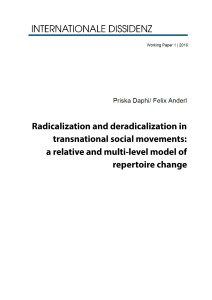In their „Radicalization and deradicalization in transnational social movements: a relative and multi-level model of repertoire change“ (International Dissidence Working Paper 1/2016), Priska Daphi and Felix Anderl present a new model for researching repertoire change in transnational social movements:
 While repertoires are a common concept in social movement studies, little is known about how changes in repertoires occur. When do activists change protest tactics? Why do some innovations stick and others do not? This conceptual paper proposes a relative and multi-level approach to analysing changes in repertoires addressing shortcomings in existing research on radicalization and social movement repertoires. Focussing on transnational activism we propose, on the one hand, to define radicalization and deradicalization as processes of change relative to existing repertoires, which do not necessarily include violence. On the other hand, we argue drawing on examples from the Global Justice Movement that these processes are crucially shaped by the interplay of different factors at the local, national, and transnational level. Processes of radicalization and deradicalization depend on the combination of factors such as opportunity structures, protest cycles, relational dynamics, and political learning at these three levels.
While repertoires are a common concept in social movement studies, little is known about how changes in repertoires occur. When do activists change protest tactics? Why do some innovations stick and others do not? This conceptual paper proposes a relative and multi-level approach to analysing changes in repertoires addressing shortcomings in existing research on radicalization and social movement repertoires. Focussing on transnational activism we propose, on the one hand, to define radicalization and deradicalization as processes of change relative to existing repertoires, which do not necessarily include violence. On the other hand, we argue drawing on examples from the Global Justice Movement that these processes are crucially shaped by the interplay of different factors at the local, national, and transnational level. Processes of radicalization and deradicalization depend on the combination of factors such as opportunity structures, protest cycles, relational dynamics, and political learning at these three levels.



